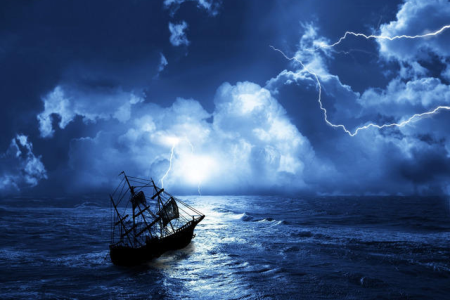The movie Noah created a widespread buzz about the Bible story. Here is Kabbalah’s take on the Noah story:
1. The Story of Noah in a Nutshell
In a nutshell, the Bible story of Noah speaks of sinful people and the Creator, who brings a flood on the world. “Noah was a righteous man, perfect in his generations” (Genesis, 6:9). This is why he was the one chosen to survive the flood.
But he did not survive alone. Rather, he was commanded to build an ark and move into it along with his kin, and pairs of all the animals, and to remain in the ark for forty days and forty nights until the flood stopped.
The Creator made a covenant with Noah and his family that the flood would never return. As a token of the covenant, He placed the rainbow in the sky. More » [Source: Dr. Michael Laitman, Noah Parsha – Weekly Torah Portion.]
2. What Is the Meaning of the Story of Noah in the Bible?
“Noah was in his generations a man righteous and whole-hearted; Noah walked with God.”
So begins the chapter on Noah, immediately confusing the reader with what appears to be a straightforward story about our world.
However, it confuses only those who aren’t yet ready to read the Bible differently, still finding the simple historical narrative about a person named Noah satisfactory.
Ask yourself, “Where am I in this story of Noah?” Or better yet, “What is the meaning of my inner Noah?” You must seek only one approach to the contents of this book: “Everything I read here is about me.” Noah, the righteous, his wife, kids, and all the animals, the ark and the Tower of Babel all exist within me. They are forces, desires that govern my inner and outer worlds. All I have to do is get to them and sense them, and the gates to all the secrets will open for me. More » [Source: Semion Vinokur. What Is the Meaning of the Story of Noah in the Bible?]
3. What Is the Meaning of Noah’s Ark & the Flood in the Bible?
Mayim (“water” in Hebrew) is the flood that will drown your spiritual embryo if you heed the body’s questions, destroying all that you’ve worked so hard to assemble within.
The flood comes as a ruthless force that can destroy everything. Those desires that couldn’t endure the questions, meaning those that didn’t “come into the ark,” truly perish in its waters: “And all flesh perished that moved upon the earth.” And yet, the paradox is that for all its ruthlessness, the flood also purifies.
However, it purifies only those in whom the desires to attain the spiritual world prevail. It is as if man doesn’t even hear the rational questions of his body as he advances toward the goal, no matter what. In this case he acts like Noah, building himself an ark (finding the right books, the right teacher, and the right environment). He will also take shelter there with his numerous individual desires that are yet to be corrected (but will be corrected as the ark “sails” the flood waters). More » [Source: Semion Vinokur, “What Is the Meaning of Noah’s Ark & the Flood in the Bible?“]
4. What Is the Meaning of the Story of the Entrance to Noah’s Ark Amidst the Flood?
“And I, behold, I do bring the flood of waters upon the earth, to destroy all flesh, wherein is the breath of life, from under heaven; every thing that is in the earth shall perish. But I will establish My covenant with you; and you shall come into the ark.”
How is the building of the ark done? We can do it primarily with the help of the books. In addition to this book, you seek out others like it, written by those who have already attained their root, the Upper World, and convey through them their attainment.
These books are like roadmaps designed to guide you to your goal via the shortest possible route. These books are few in number.
They aren’t meant to expand your knowledge, but to cultivate within you the sensation of the Upper One.
They are written by great Kabbalists: Abraham, Moses, Rabbi Shimon Bar Yochai, the ARI (Rabbi Isaac Luria), and Baal HaSulam (Rabbi Yehuda Ashlag).
So, if you refuse to let up until you’ve found the right books, it means you’re “building an ark.” You delve into the books, and at first, you don’t understand them one bit, but you continue to read. This is how you “erect the walls of the ark.”
Then, you find a teacher, a guide who will not let you stray from the path, and you find friends with whom you will overcome the obstacles that stand between you and the goal. This is how you “lay the roof of the ark.” More » [Source: Semion Vinokur. “What Is the Meaning of the Story of Noah’s Ark Amidst the Flood?“]
5. What Is the Meaning of the Birth after the Flood in the Bible Story?
“And it came to pass at the end of forty days, that Noah opened the window of the ark which he had made. And he sent forth a raven, and it went forth to and fro, until the waters were dried up from off the earth. And he sent forth a dove… But the dove found no rest for the sole of her foot, and she returned unto him to the ark.”
What did you do at the moment you were disconnected from the material world, having returned to it afterward with a specific program of correction? You took the light egoistic desires, known as “raven” and “dove,” which were corrected in the ark, and used them to “feel the earth” (the desire). In so doing, you seemingly asked yourself, “Will the ego suck me in again?”
Why does this happen at the end of forty days, and what is the “window” that is made?
Forty is the quality of the Creator, the quality of absolute bestowal, the quality of a mother. What you are doing here is making a “tiny window” in it. You are introducing a certain dissonance into this idyll by adding a dash of egoism to it. This enables you to check whether you can establish contact between your altruistic and egoistic qualities (by sending forth a raven and then a dove—qualities that have undergone correction in the ark).
Can there be contact between the two?
As it turns out, the answer is “no,” since both birds return to the ark. More » [Source: Semion Vinokur, “What Is the Meaning of the Birth After the Flood in the Bible Story?“]
To learn more about how Kabbalah describes Bible stories and many other concepts at their root level, before they dress into the material world, it is recommended to take the Free Kabbalah Course. The reason is that many of the concepts and terms we have heard a lot about in our upbringing have completely different definitions in Kabbalah, and it takes a while to process them properly. Therefore, if you’re interested in this topic, then we recommend taking the free course and start learning about the world around you and inside you anew. Click the banner below to sign up for the free course …



There is a show on TV called Through the Wormhole which is based on what science knows and speculates upon including possible origins of existence i.e. the creation. I genuinely love this series yet somehow when I read Kabbalah’s interpretations of biblical stories as lessons to be learned I am equally excited and find comfort in their explanations. My only problem (and possibly just a small one at that) is resolving the difference between science and “mysticism” Thank you for taking the time to offer these stories